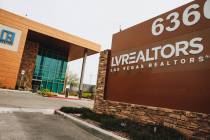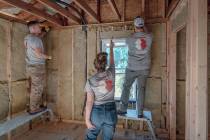Condo deal falls through because of lawsuit
Q: A family member was recently just about to close on a condo purchase in a complex, when the mortgage company disapproved her loan at the last minute when it discovered during a review of the homeowners association documents that this complex was in litigation . I understand other mortgage companies are also denying loans for the same reason. In addition to this loan falling through, the seller’s realtor is refusing to sign documentation that would allow return of the earnest money, despite having never disclosed upfront that there was any litigation matter with this HOA. This seems to be a double whammy where we are trying to find out how to get that refund and make sure this doesn’t happen again with the next condo purchase. I did an online search on this and it appears quite a few HOAs/communities are affected by this litigation. Are you aware of this and perhaps have any advice on how this can be handled and/or tell us who we should contact to help us in this matter? Perhaps there is a Nevada law that covers this.
A: This is an unfortunate problem and, frankly, one that the state legislators could have taken action on much sooner to help stop the bleeding. This litigation that you mention revolves around the nine-months superiorlien law in Nevada Revised Stature 116.3116 (3b). There are literally thousands of such cases that are flooding the Nevada Real Estate Division with banks’ alternative dispute resolutions cases, and also in the Federal State District Courts. Here is a quick summary of how we got to this point, which has not only impacted potential sellers and buyers but also homeowner associations and their members.
1. Associations have a fiduciary responsibility to collect their assessments from delinquent homeowners. After a period of time (based on their collection policies) to carry out their fiduciary responsibilities to their homeowners, associations initiated foreclosure actions against the delinquent homeowners. There are two important steps in the foreclosure process which are the notice of default and the notice of sale that is sent to the delinquent homeowner and, in most cases, to anyone institution or person that had a financial interest in the home that had recorded its interest with the Clark County Recorder’s Office. According to the state law, when the delinquent account reached nine months, in order to protect the lender’s interests in the home, the lender was to pay the association the nine months of past due assessments. Sounds simple, right?
2. During the Great Recession, with thousands of homes that had delinquent mortgages, too many lending institutions did not pay the associations their nine months of past-due assessments even when they were properly notified by collection agencies for the associations. Consequently, associations continued their foreclosures and at the end of the foreclosure process, if there were no buyers to pay off the associations’ delinquencies, the associations received foreclosure deeds.
3. Why did the lenders not pay these superior liens to the homeowner associations? There are many reasons or excuses from the lenders of why they failed to pay the nine months of delinquent assessments, but the primary reason in my opinion is that the lenders never believed that our State Supreme Court would rule that their failure to pay the nine months would result in the extinguishing of the lenders loans. Let me illustrate. Suppose you have a mortgage of $ 200,000 and you decided you needed a second mortgage of $ 50,000 on your home as you needed the funds. You become delinquent on your first loan, the $ 200,000 mortgage. If the holders of the second mortgage fails to make good your delinquency on the first loan and if the lender of the first loan completed the foreclosure process, the holders of the second loan would lose their $50,000. NRS 116.3116 (3b) stated that a lender’s mortgage was superior to the association’s lien until the point in time when statutorily the nine months delinquency moved into “first place.” This also was confirmed in the Nevada State Supreme Court case of SFR Investments Pool 1 v. Bank that an association’s non-judicial foreclosure on a delinquent assessment lien extinguishes a lender’s first deed of trust.
4. Now during the Great Recession, there were investors who saw financial opportunities in becoming actively involved in buying the delinquent homes from the associations for substantially less than their current market values. In many cases, the current market values were already less than the loans on the homes. At a duly notice of sale, these investors purchased these homes by paying off the delinquent assessments. A home might have had a loan balance of $800,000 at the start of the recession, but the market value during the recession could have decreased to $300,000. If the homeowner owed the association $10,000 in back assessments, the investor could have purchased the home by paying the $10,000. What is important to note is that the investor received a foreclosure deed from the sale. The investor did not receive a clean title to the property. To receive a clean title (called quiet title), the investor would have to initiate a law suit in District Court. If the lenders were banking that the State Supreme Court would rule that an association’s foreclosure would not extinguish their loans, the investors were banking the court would rule the lenders’ loans would be extinguished.
5. This very short summary of the events (and there are still so many unanswered legal issues that are still with the State Supreme Court) laid the groundwork of thousands of cases where the lenders are suing the homeowner associations based on different angles suggesting that the associations improperly foreclosed on the homes. The banks want to be either reimbursed for the balance of their unpaid loans or be given back the property. Collection agencies and the investors will be added to these suits and unfortunately there will be individual homeowners who will shortly be notified that the homes they bought for residency and not as investments may be in jeopardy depending upon the outcome of these cases.
The lending institutions created this dilemma. Now we have a Catch-22 where some of the banks that have initiated these law suits are now not issuing loans to new purchasers, as in your case.
As to the second issue, where the seller is refusing to sign the documentation that would allow the buyer to receive his earnest money deposit, it is necessary to review the purchase agreement and what it stated. Most purchase agreements would have a statement that the purchase of the home is subject to the buyer obtaining a mortgage in order to close on the purchase of the home. The family member needs to meet with the title/escrow company’s office manager to discuss the problem and to see what options he has other than going to court.
As to any final comments, these complaints and district court law suits will continue to create havoc for a very long time. To settle these claims will be costly and how they are going to be paid could ultimately impact the finances of homeowner associations which could lead to associations filing bankruptcies. The lenders are creating a situation that could backfire, as association funds to provide services and to maintain common facilities could substantially decrease, causing the market values of the loans on their homes to fall.
Barbara Holland is a certified property manager, broker and supervisory certified association manager. Questions may be sent to holland744o@gmail.com.






















